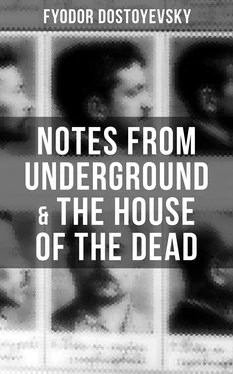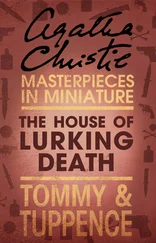Orloff, on the contrary, was a brilliant example of the triumph of spirit over matter. He had a perfect command over himself. He despised punishment, and feared nothing in the world. His dominant characteristic was boundless energy, a thirst for vengeance, and an inflexible will when he had some object to attain.
I was not astonished at his haughty air. He looked down upon all around him from the height of his grandeur. Not that he took the trouble to pose, for bis pride was an innate quality. I don’t believe anything had the least influence over him. He looked upon everything with the calmest eye, as if nothing in the world could surprise him. He knew well that the other prisoners respected him but he never took advantage of it or gave himself airs.
Nevertheless, vanity and conceit are defects from which scarcely any convict is exempt. Orloff was intelligent and strangely frank in talking too much about himself. He replied point-blank to all the questions I put to him, and confessed that he was waiting impatiently for his return to health in order to take the remainder of the punishment he was to undergo.
‘Now,’ he said to me with a wink, ‘it is all over. I shall take the remainder, and then be sent to Nertchinsk with a convoy of prisoners. I shall use the opportunity to escape, and am confident I shall succeed. If only my back would heal a little quicker!’
For five days he was burning with impatience to be in a condition to leave hospital. At times he was gay and in the best of humours, and I profited by those rare occasions to ask him about his adventures.
He would contract his eyebrows a little, but always answered my questions straightforwardly. When he realized that I was endeavouring to see through him and discover in him some trace of repentence, he looked at me with a haughty and contemptuous air, as if I were a foolish little boy whom he honoured too highly with his conversation.
I detected in his countenance a sort of compassion for me. After a moment’s pause he would laugh out loud, but without the least irony, and I fancy he must, more than once, have laughed in the same manner when my words returned to his memory. At last he signed himself out as cured, although his back was not yet completely healed. As I too was almost well again, we left the infirmary together. I returned to barracks, while he was shut up in the guard-room, where he had been formerly detained. On parting he shook hands with me, which in his eyes was a signal mark of favour. I fancy he did so because at that moment he was in a good humour; but in reality he must have despised me, for I was a feeble being, in all respects contemptible, and guilty above all of resignation. Next day he underwent the second half of his punishment.
When the doors of our barrack had been locked at night there was, in less than no time, a different atmosphere: the air of a private house, almost indeed of home. It was only then that I saw my comrades at their ease. For during the day the under-officers, or some other official, might suddenly arrive, so that the prisoners were always on the alert and never quite relaxed. As soon, however, as the bolts had been shot and the doors padlocked, everyone sat down in his place and began to ply his trade. The room was lighted up in an unexpected manner: each convict had his candle in its wooden sconce. Some of them stitched boots, others sewed various kinds of garment. The air, already poisonous, became more and more impure.
Some of the prisoners, huddled together in a corner, played at cards on a piece of carpet. In each barrack there was a prisoner who possessed a small piece of carpet, a candle, and a pack of horribly greasy cards. The owner of the cards received from the players fifteen kopecks (about sixpence) a night. They generally played at ‘three leaves’-Gorka, that is to say-a game of chance. Each player placed before him a pile of copper money-all that he possessed-and did not get up until he had either lost it or broken the bank.
Play continued far into the night, and daybreak sometimes found the gamblers still at their game. Often, in fact, they did not cease until a few minutes before the doors were opened. In our room, as in every room, there were beggars ruined by drink and play, beggars by nature. I purposely say ‘by nature’; for in every class of Russians there are, and always will be, strange easygoing people whose destiny it is always to remain beggars. They are poor devils all their lives, creatures broken down who remain under the domination or guardianship of someone, generally a prodigal or a man who has suddenly made his fortune. All initiative is for them an intolerable burden. They only exist on condition of undertaking nothing for themselves, of serving and living perpetually subject to another’s will. They are destined to act by and through others. Under no circumstances, even of the most unexpected kind, can they get rich; they are always beggars. I have met these persons in all classes of society, in all coteries, in all associations, including the literary world.
As soon as a card party was made up, one of these beggars (who were quite indispensable to the game) was summoned. He received five kopecks for a whole night’s employment-and what employment! His duty was to keep guard in the corridor, in thirty degrees (Reaumur) of frost and in total darkness, for six or seven hours. The man on watch had to listen for the slightest noise; for the governor or one of the officers of the guard would sometimes make a round quite late at night. They used to arrive unexpectedly, and sometimes caught players and the watchers in the act-thanks to the candlelight which could be seen from the courtyard.
When the key was heard grating in the padlock it was too late to put the lights out and he down on the plank bedsteads. Such surprises were, however, rare. Five kopecks was a ridiculous payment even in prison, and the gamblers’ harsh demands astonished me in these as in many other cases:
‘You are paid, you must do what you are told.’ This was the argument, and it admitted of no reply. If you paid someone a few kopecks you had the right to turn him to the best possible account, and even a claim to his gratitude. More than once I saw convicts spend their money extravagantly, throwing it around, and at the same time cheating the man employed to watch. I have witnessed this kind of thing in several barracks on numerous occasions.
I have already said that, with the exception of the gamblers, everyone worked. Five only of the convicts remained completely idle, and went to bed at the first opportunity. My bed was near the door. Next to me was Akim Akimitch, and when we were lying down our heads touched. He used to work until ten or eleven o’clock, pasting together pieces of paper to make multicoloured lanterns which had been ordered by someone in the town, and for which he was well paid. He excelled in this kind of work, and did it methodically and regularly. When he had finished he carefully put away his tools, unfolded his mattress, said his prayers, and slept the sleep of the just. He carried his love of order even to pedantry, and must have secretly believed himself a man of brains, as do most narrow, mediocre persons. I did not like him the first day, although he afforded me plenty of food for thought: I was astonished to find such a man in prison. I shall have occasion to speak of Akimitch again.
But I must proceed with my description of those with whom I was to live for years. They were to be my companions every moment of that time, and it will be understood that I regarded them with anxious curiosity.
On my left slept a group of mountaineers from the Caucasus, nearly all of them exiled for brigandage, but condemned to different punishments. There were two Lesghians, a Circassian, and three Tartars from Daghestan. The Circassian was a morose and sombre fellow. He scarcely ever spoke, and looked at you sideways with a sly, sulky, wild-beast expression. One of the Lesghians, an old man with an aquiline nose, tall and thin, looked a real brigand, but the other (Nourra was his name) impressed me most favourably. He was of middle height, still young, built like a Hercules, with fair hair and violet eyes; his nose was slightly turned up, while his features were somewhat of a Finnish cast. Like all horsemen, he walked with his toes in. His body was striped with scars, ploughed by bayonet wounds and bullets. Although he belonged to the conquered region of the Caucasus, he had joined the rebels, with whom he used to make continual incursions into our territory. Everyone in prison liked him because of his gaiety and affability. He worked without murmuring, always calm and peaceful. Thieving, cheating, and drunkenness filled him with disgust, or threw him into a rage-not that he wished to quarrel with anyone; he simply turned away with indignation. During his confinement he committed no breach of the rules. Fervently pious, he said his prayers every evening, observed all the Mohammedan fasts like a true fanatic, and passed whole nights in prayer. Everyone liked him, and considered him a thoroughly honest man. ‘Nourra is a lion,’ they used to say; and the name ‘Lion’ stuck to him. He was quite convinced that as soon as he had finished his sentence he would be sent back to the Caucasus. Indeed, this hope alone kept him alive, and I believe he would have died had he been deprived of it. I noticed it the very day of my arrival. One could not but be struck by that calm, honest countenance in the midst of so many sombre, sardonic, and repulsive faces.
Читать дальше












